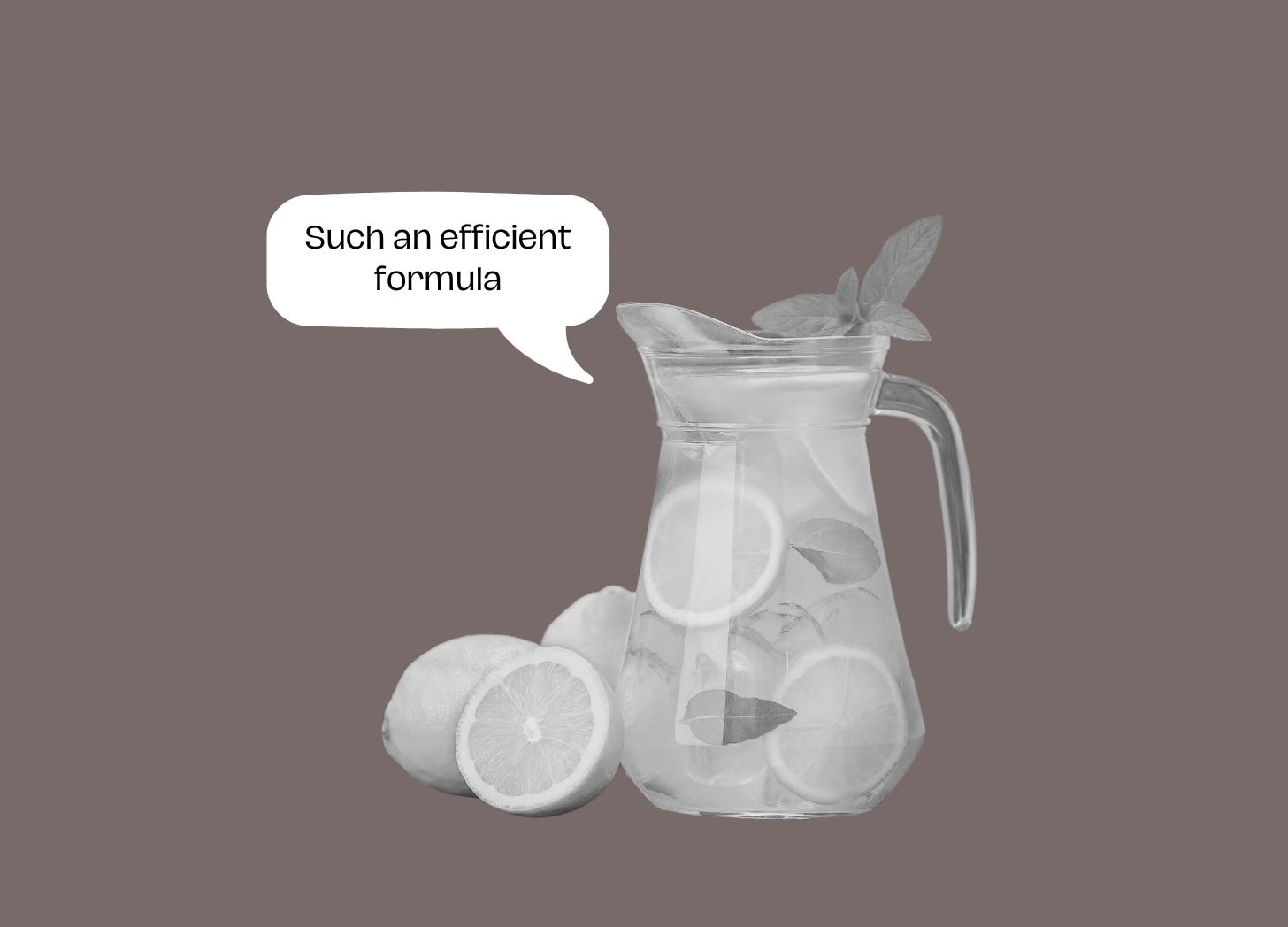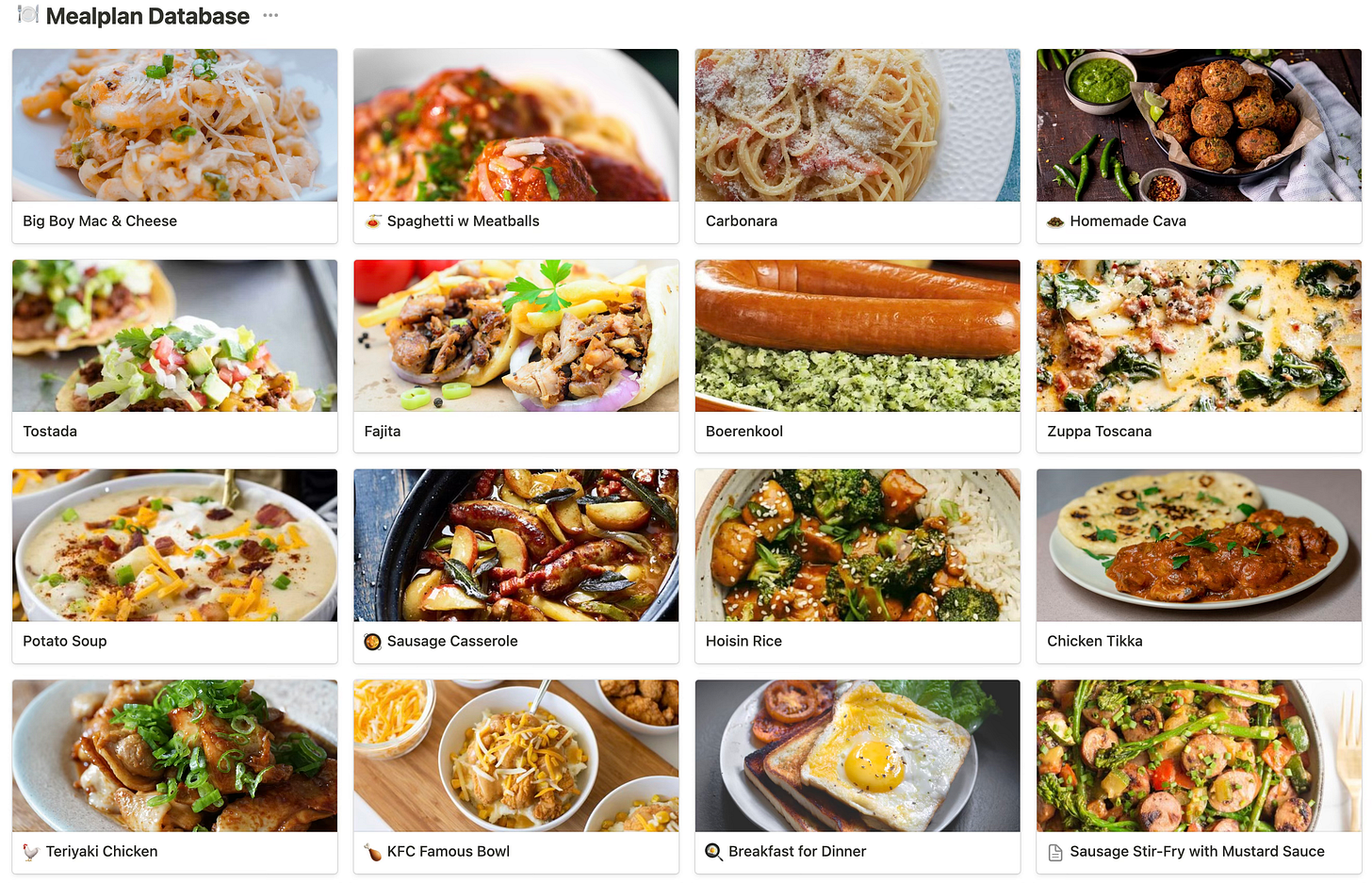Making Lemonade
When the lemons have to be categorized and catalogued
Just in case you missed it last time: Every Sunday, I’ll post the Sunday Brunch (this newsletter) which is a bunch of thoughts from last week.
Family Slice: on Instagram we (my wife and me) noticed, that the content about our married life was very meaningful to people. So every week I’ll share a thought on our family life.
This Week’s Special: this section is something that happened in the news that was particularly of interest to me. It can be anything - from politics to some local news.
The Crust of the Matter: As a theologian, I have thoughts. As you get to know me, they are quite… interesting haha.
Bytes: I always dreamt of starting a YouTube channel just like MKBHD - obviously this didn’t happen but that doesn’t mean that I’m not super into tech anymore. If anything, I’m even more into tech now than ever since I finished with all my education. This section talks about my geeky tech things of the week. It could have to do with theology, a video game, or some sort of a gadget.
Pie To Go: What’s on my radar for this coming week.
Starting this August I’ll also release a paid newsletter where I will dig deep into some scripture as an intersectional theologian. The first series will be ‘Why the “clobber verses” are not clobber verses’. To get the free newsletter click the button below:
Family Slice: Finding Peace in Spreadsheets
I've been diagnosed with OCD. Now, that statement comes with more layers than a mille-feuille pastry. Back in the '90s, I was diagnosed with a large array of mental health conditions. Borderline Personality Disorder (BPD), followed by Paranoia and Narcissistic Personality Disorder. If you have any DSM knowledge, you're probably shaking your head at the psychology of the '90s, diagnosing a 14-year-old with BPD. It almost felt like they didn't want anyone to feel left out, so they handed out BPD diagnoses like party favors.
Fast forward almost 30 years, and my last three therapists are convinced I was misdiagnosed. They believe I have PTSD, which, given my long list of traumas, wouldn't be surprising.
But let's get back to the OCD. Sometimes we have to make lemonade out of lemons, and in my case, that means finding calm in lists, spreadsheets, and life optimization.
For instance, I've discovered that music is a guaranteed quick fix when I feel crushing depression kick in. So, I've strapped a Positive Grid Spark Go to my electric guitar. Now, with just one button press, I can wander around the house playing mind-numbing deathcore riffs. It's my secret ingredient for battling the blues. Another example is that lists really make me calm. Every day, my wife Kim creates a list for me; "paramount" things that need to happen and things I can expect from her based on her bandwidth and capacity.
With Kim losing her job, I've been recreating our debt repayment plan. Let me tell you, taking the time to plan debt repayment is amazing! We've got a couple of scenarios mapped out, mostly based on what job Kim will get and how many contracts I need. It's hard to get a clear picture of how much we need to earn to pay off our debts without it taking too long. Being able to see exactly when you pay off your last amount is soothing, at least for me.
If you’d like to map out your debt payment as well - use this handy snowball calculator that my friend the Bullwinkle has given me (that’s not his real name but that is how I call him). It's completely free and you'll do me a favor by letting me explain it to you. Remember? I'm diagnosed with OCD, and optimizing lives literally gives me rest so please help me one cell at a time!
This Week's Special: Harris vs. Trump - A Lesson in Intersectionality
In case you've been living under a rock (or perhaps kneading dough with noise-cancelling headphones), our former president made waves again last week. But it's not his actions that caught my attention - it's Kamala Harris's response and why it's worth discussing.
Trump's interview with the National Association of Black Journalists was, to put it mildly, contentious. Some members even protested his invitation and resigned. During the interview, Trump made several cringe-worthy statements, but the most notable was his apparent confusion about Harris's identity:
"She was Indian all the way, and then all of a sudden she made a turn and she became a Black person."
Trump mused, as if racial identity was as simple as choosing a flavor at Baskin-Robbins. (Newsflash, Donald: People can be more than one scoop!)
The media predictably pounced on this quote, with most outlets decrying its racist undertones and others viewing it as Trump's attempt to reclaim the spotlight from Harris. However, I believe they missed an aspect that those of us with intersectional identities immediately recognized: the futility of engaging with those who refuse to understand the complexities of our identities.
I've long advocated for foundationalism as a tool for bridging divides. After all, how can we discuss complex issues if we don't share a basic understanding? We've seen this play out in debates over Critical Race Theory, transgender rights, and now here with multiracial identity. When we lack a common foundation, we end up talking past each other, often to our detriment.
Harris, being an intersectional figure herself, handled Trump's comments masterfully. She denounced his claims and swiftly moved on, stating, "It's the same old show, the American people deserve better." This response served two purposes: it refused to let a white man define her intersectional identity, and it modeled for the American people an important lesson - engaging Trump on his terms only amplifies his messaging and distracts from the real issues at hand. In other words, Harris knew better than to let Trump's half-baked ideas rise to prominence
Now, I'll admit I'm still forming my opinion on Harris as a candidate. But when I talk about the importance of having intersectional voices at the table, this is exactly what I mean. Harris, as an Indian-American, Black, and female politician, has undoubtedly faced her share of identity-based challenges. People like her have had no choice but to approach the world with a degree of ambiguity.
The irony is grueling here - Harris is operating under a constitution created by white slaveholders, yet she's able to work within that framework - a testament to her comfort with ambiguity. Meanwhile, some of us seem to want everything in black and white. I hate to break it to you, but that's a luxury many of us don't have.
Intersectionality isn't just an academic concept - it's a lived reality that shapes how people navigate the world and respond to challenges. As we move forward in this election cycle, it's worth paying attention to how candidates with diverse backgrounds handle complex situations. It might just give us insight into how they'll lead in an increasingly diverse and complex world. After all, it takes more than one ingredient to make well-balanced policies.
The Crust of the Matter: The Irreversible Journey of Deconstruction
We recently cancelled our Netflix subscription - mostly because it's now a whopping $25. Remember when it was just $10? I suppose fair wages and all that, but unfortunately, it's pushed streaming beyond our budget. However, with our last month of Netflix looming, I seized the opportunity to binge-watch all the shows I'd missed, including "The Brothers Sun." You could say I was determined to get my just desserts before our subscription expired.
There's one scene in particular that really struck a chord with me (apologies for the spoilers ahead). Bruce, living a simple life with his mom, dreams of doing improv while his mother envisions him becoming a doctor. But when his long lost brother Charles reveals that Bruce is actually the son of one of Taipei's biggest Triad bosses, everything changes. Over several episodes, we witness the gradual realization that the life they both had before is irretrievably lost.
This moment of "we can never go back to the way it was" resonated deeply with me, particularly in relation to the process of faith deconstruction. Once you allow yourself to question your faith and recognize that some of our old interpretations were not just off-base but potentially damaging, there's no going back.
Last Thursday, I wrote my first paid newsletter, which was part one of a multi-part essay discussing why the Bible doesn't condemn homosexuality, but also why it doesn't condone it either. The cliff notes version is this: the Bible wasn't written with people like me in mind, and therefore, it's specifically not affirming to any form of queerness.
This realization brings me to a concern I have for the Christian deconstructing church. We've done a commendable job in taking the first steps of deconstruction, but then we often revert to using conservative hermeneutics for the rest of the text. Here's the deal, though: we can't go back to the way it was anymore. You now have information in your head that you can't unsee, and it's a pipe dream to think we can rectify one issue and move on with the same hermeneutics. It's like trying to unbake a cake - once those ingredients are mixed and heated, there's no going back to eggs and flour.
We've seen this pattern before with slavery. We addressed the issue and said, "The Bible was never pro-slavery; it just put guidelines in a world that was pro-slavery." Now, we seem to be doing it again with LGBTQ+ issues: "The Bible wasn't against gay people; it just put guidelines around relationships." But I propose we resist this approach.
We can't allow biblical authors to define our existence. For some, these interpretations might feel like “straightforward” items - "Should I divorce or not?" But for others, like myself, who weren't even conceptualized in biblical times, we have to find a way to utilize this document and glean lessons from it without expecting it to explicitly affirm our identities.
This is the challenge of modern faith: how do we engage with ancient texts in a world their authors couldn't have imagined? How do we honor the wisdom of the past while acknowledging its limitations? These are the questions we need to grapple with as we move forward in our faith journeys.
Deconstruction isn't about demolition; it's about careful examination and thoughtful reconstruction. It's about building a faith that can withstand scrutiny and embrace complexity. And while it might be tempting to look back at the simplicity of our old beliefs, remember: just like Bruce in "The Brothers Sun," we can't go back to the way it was. But maybe, just maybe, we can build something even better moving forward. After all, sometimes you need to break a few eggs to make a better theological omelette.
Bytes: The Sweet and Sour of Digital Organization
Since we've already dipped our toes into the spreadsheet soup in the Family Slice, let's continue that theme and talk about how I actually set up these newsletters. Because, of course, I can't prepare this in Apple Notes, right? I need a system that's connected to a database. But there's a catch - because ultimately, I use Apple Notes for almost everything.
If you know me a bit, you're aware that I'm an early adopter of Notion. For the uninitiated, Notion is an app that allows you to create pretty-looking notes and connect them to a database. After reading the Family Slice, you probably know me a little more than you should, so you can imagine that I've gone absolutely bananas with Notion. I've used it for almost every function I've held in the last decade, and I'm still using it to prepare this very newsletter.
There's this dude called Tiago Forte who came up with the PARA method, which stands for PROJECTS, AREAS, RESOURCES, and ARCHIVE. It's a great system for organizing both your personal and work life, like a well-stocked pantry for your digital world:
AREAS: These are the high-level categories of your life. An area doesn't have a start and end date; it's just an ongoing part of your life. Areas have multiple projects nested inside them. For example, "Household" is an area, and so is "School."
PROJECTS: Inside areas, there are many projects. For example, the "Household" area has many projects that are either active or need to be archived. The point is to be as granular as possible. A project could be "Week 1 Cooking." It's a project because there are 21 meals that need to be prepared, each with time, money, and grocery requirements.
RESOURCES: For this, I use the Notion web clipper. I basically have a database set up, and every time I read something I think I'll need for this newsletter or a work project, I'll clip it.
ARCHIVES: Don't save but also don't delete. The more clutter-free your environment, the better. If it's something you want to reference later, your archive is the best place for it. Think of it as your digital deep freeze.
This system can be implemented in a bullet journal, Google Doc, Excel sheet - whatever floats your boat.
BUT! (And this is a big, chocolate-chip-cookie-sized but) There's a major caveat to this approach and to Notion (and Obsidian or Evernote, for that matter). Min-maxing your life like this will only get you so far. It's like trying to bake the perfect cake by obsessively measuring each grain of sugar - at some point, you're just wasting time.
I used to have a very intricate content scheduler for my Instagram account, but ultimately, getting things in the right places took longer and actually made my creative process suffer. At first, I added tags to my Apple Notes, but even that required organization. The pure chaos of just opening a note, writing my reel script, asking my wife for feedback - that just did the job better.
In the end, while digital organization tools can be incredibly useful, sometimes the best approach is to find a balance between structure and flexibility. It's okay to have a little chaos in your digital kitchen - often, that's where the most delicious ideas are cooked up.
Pie To Go
🎸 I thought the younger you were, the easier it was to get better at playing the guitar. Well, this is not true for me. It must be because I'm more patient now than when I was younger. I'm getting faster, more accurate, and I actually understand the circle of fifths now. When I was 12, my guitar teacher told me he couldn't continue working with me because every time he gave me a piece of sheet music, I would memorize it instead of reading it.
🇳🇱 My family is coming from the Netherlands, which is pretty exciting! We used to be essentially twins, haha. Trucker hat, big beard, glasses. Now I'm his little sister. Kinda cool.
🏋🏽♀️ I've been working out since May, and I've never stuck to it this long. I guess weights were never my thing? Well, I was wrong because I really love lifting weights now. I still feel out of sorts among all the steel, but I've been trusting the system and I'm getting strong! I can almost do a pull-up, yay!






